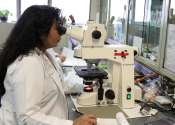New model extends theory of pattern formation to the nano-cosmos
A new model developed by scientists from the Max Planck Institute for Dynamics and Self-Organization (MPI-DS) extends the theory of elastic phase separation towards nanoscopic structures. Such patterns are frequent in biological ...









